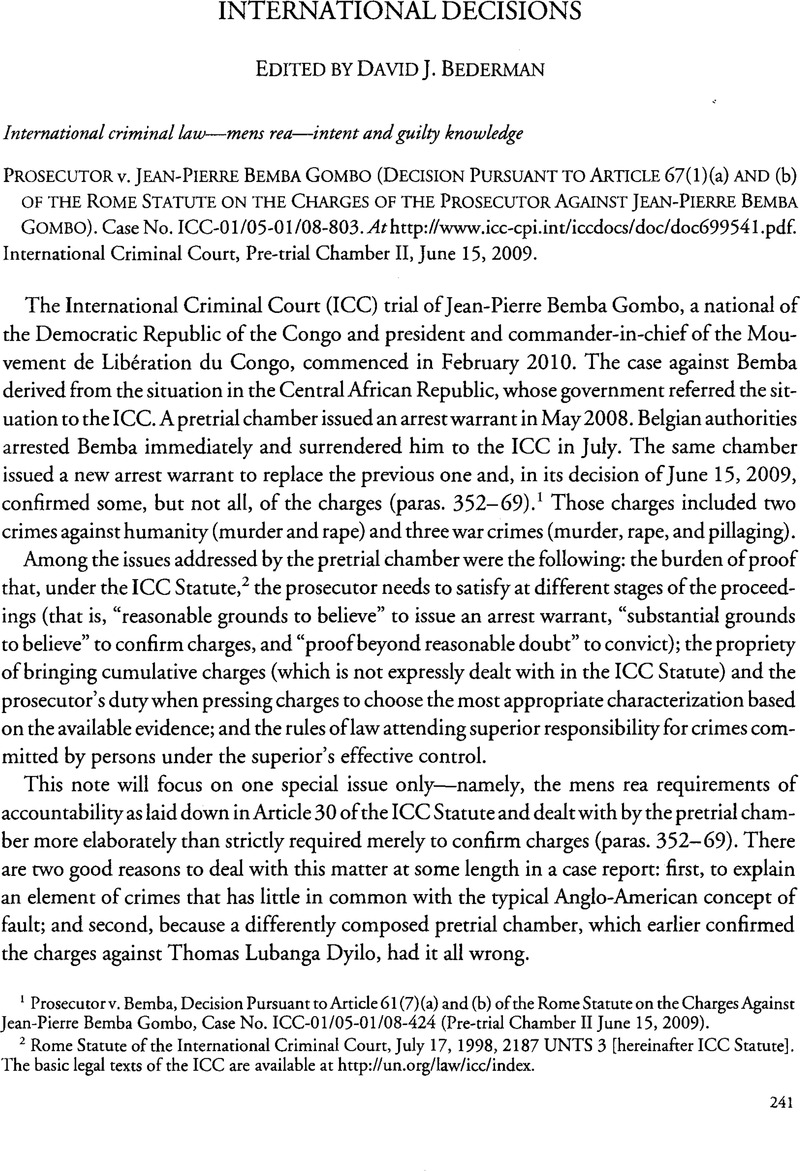Article contents
Prosecutor V. Jean-Pierre Bemba Gombo (Decision Pursuant to Article 67(1)(a) and (b) of the Rome Statute on the Charges of the Prosecutor Against Jean-Pierre Bemba Gombo)
Published online by Cambridge University Press: 27 February 2017
Abstract

- Type
- International Decisions
- Information
- Copyright
- Copyright © American Society of International Law 2010
References
1 Prosecutor v. Bemba, Decision Pursuant to Article 61 (7) (a) and (b) of the Rome Statute on the Charges Against Jean-Pierre Bemba Gombo, Case No. ICC-01/05-01/08-424 (Pre-trial Chamber II June 15, 2009).
2 Rome Statute of the International Criminal Court, July 17, 1998, 2187 UNTS 3 [hereinafter ICC Statute]. The basic legal texts of the ICC are available at http://un.org/law/icc/index.
3 See Nicola, Pisani The Mental Element in International Crime , in 2 Essays on the Rome Statute of The International Criminal Court 121, 128–29 (Flavia, Lattanzi & William, A. Schabas eds., 2004).Google Scholar
4 See Steffen, Wirth Gegen Völkermord und Vertreibung: Die Überwindung des zwanstigsten Jahrhunderts , in 28 Argumente und Materialien Zum Zeitgeschehen 59, 61 n.5 (2001)Google Scholar; Albin, Eser Mental Elements—Mistake of Factand Mistake of Law , in 1 The Rome Statute of The International Criminal Court: A Commentary 889, 905–06 (Antonio, Cassese Paola, Gaeta & John, R. W. D. Jones eds., 2002).Google Scholar
5 Johan, D. van der Vyver The International Criminal Court and the Concept of Mens Rea in International Criminal Law , 12 Univ. Miami Int’l & Comp. L. Rev. 57, 62–63 (2004).Google Scholar
6 See Prosecutor v. Lubanga Dyilo, Decision on the Confirmation of Charges, Case No. ICC-01/04-01/-6-803 tEN, para. 351 (Jan. 29, 2007); Prosecutor v. Katanga, Decision on Confirmation of Charges, Case No. ICC-01/ 04-01/07-717, para. (Sep. 30, 2008).
7 See Lubanga, para. 352(i); Katanga, para. 530.
8 See Albin, Eser Mental Elements—Mistake of Fact and Mistake of Law , in 1 The Rome Statute of The International Criminal Court: A Commentary,Google Scholar supra note 4, at 889, 915 (noting that liability based on mere awareness of the risk that one’s conduct may result in the prohibited consequence—dolus eventualis—”seems not to be the position of the Rome Statute”); Pisani, supra note 3, at 129-30 (noting that “awareness that a circumstance exists or a consequence will occur in the ordinary course of events” includes oblique and direct intention (which is correct but only insofar as the author identifies “oblique intent” with dolus indirectus)). According to Donald, Piragoff Mental Element , in Commentary on The Rome Statute of The International Criminal Court 527, 533 (Otto, Triffterer ed., 1999)Google Scholar, the combination of “intent” and “knowledge” as contemplated in the ICC Statute denotes dolus directus. This writer respectfully disagrees: it is not the knowledge of, but the desire to bring about, the harmful consequences of one’s act that qualifies intent to become dolus directus.
9 Lubanga, para. 352; see Hector, Olasolo Complementarity Analysis of National Sentencing or State Action? Locating the Site of Supranational Criminality , in Sentencing and Sanctioning in Supranational Criminal Law 37, 49 (Roelof, Haveman & Olaoluwa, Olusanya eds., 2006)Google Scholar (stating that “it can be argued” that Article 30 includes dolus eventualis). But see id. at 51 (concluding that “intent and knowledge militates against recklessness,” which Olasolo previously equated, id. at 50, with dolus eventualis).
10 Prosecutor v. Stakić, Case No. IT-97-24-T, para. 587 (July 31, 2003); see Olzsolo, supra note 9, at 49 (defining dolus eventualis as comprising “(i) the awareness of the risk that the forbidden result may take place as a result of one’s action or omission; and (ii) the acceptance of such result by making peace and reconciling oneself with the idea that it will occur”).
11 Katanga, para. 331.
12 Olasolo, supra note 9, at 50.
13 Prosecutor v. Blaškić, Case No. IT-95-14-T, para. 249 (Mar. 3, 2000).
14 Prosecutor v. Galić, Case No. IT-98-29-T, para. 136 (Dec. 5, 2003).
15 Antonio, Cassese Crimes Against Humanity , in 1 The Rome Statute of The International Criminal Court: A Commentary, supra note 4, at 353, 364.Google Scholar
16 Bruno, Zimmermann Article 85—Repression of Breaches of This Protocol , in Commentary on the Additional Protocols of 8 June 1977 to the Geneva Conventions of 12 August 1949, at 989, para. 3474 (Yves, Sandoz Christophe, Swiarski & Bruno, Zimmermann eds., 1987).Google Scholar
17 The appeals chamber of the Special Court for Sierra Leone has relied on the Zimmermann definition of “willfully” to hold—erroneously, I believe—that the mental element attending an act or threat of violence upon which the crime of terrorism is based “requires the Prosecution to prove that the accused acted consciously and with intent or recklessness in making the civilian population or individual civilian the object of an act or threat of violence” (emphasis added). Prosecutor v. Fofana, Case No. SCSL-04-14-A, para. 355 (May 28, 2008); see Galić, para. 54 (stating that “willfully” includes recklessness but not negligence).
18 Itzhak, Kugler The Definition of Oblique Intention , 68 J. Crim. L. 79, 79 (2004).Google Scholar
19 Glanville, Williams Oblique Intention , 46 Cambridge L.J. 417, 422 (1987).Google Scholar
20 Law Commission [Great Britain], A Criminal Code for England and Wales (Report No. 177, 1998).
21 ICC Statute, supra note 2, Art. 8(2)(a)(i).
22 Id, Art. 8(2)(a)(iii).
23 Id, Art. 8(2)(a)(vi).
24 See Piragoff, supra note 8, at n.17.
25 ICC Statute, supra note 2, Arts. 8(2)(b)(i)-(iv), (ix), (xxiv), 8(2)(e)(i)-(iv).
26 Id., Art. 8(2)(b)(xxv).
27 Eser, supra note 8, at 900; see id. at 894 (noting that mentioning a particular form of mens rea in the definition of some crimes and not in others could be (mis) interpreted to mean that fault is not an element of the latter category of offenses, but that this interpretation was precluded by the insertion of a general provision on the mental element in the ICC Statute).
28 Report of the Preparatory Committee for the International Criminal Court, Finalized Draft Text of the Elements of Crimes, UN Doc. PCNICC/2000/l/Add.2 (Nov. 2, 2000).
- 4
- Cited by




